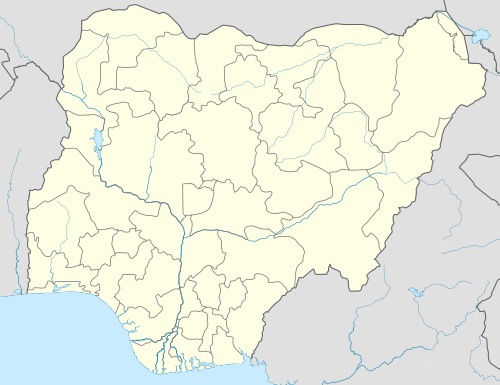Tai, Rivers
Tai is a Local Government Area (LGA) of Rivers State in Nigeria. It covers an area of 159 km2 and at the 2006 Census it had a population of 117,797. It is part of the Okrika/Oyigbo/Tai/Eleme constituency of the Nigerian Senate, represented since April 2007 by George Thompson Sekibo.[1] In the April 2007 elections the Tai LGA recorded an implausible 99.6% turnout for the Governorship election.[2] Celestine Omehia of the Rivers State People's Democratic Party was at first declared winner, but his election was later annulled and Rotimi Amaechi, also of the PDP, was declared governor.[3] In February 2009, the Chairman of Tai Local Government Area was Barry Mpigi.[4]
Tai | |
|---|---|
LGA | |
 Tai Tai shown within Nigeria | |
| Coordinates: 4°43′0″N 7°18′0″E | |
| Country | |
| State | Rivers State |
| Date created | 1996 |
| Seat | Saakpenwa |
| Population | 117,797 (2,006) |
| Time zone | UTC+1 (CET) |
Most of the people are Ogoni, speaking the Tee and Baan languages.[5] Communities include Ban-Ogoi[6], Bara-Ale, Bara-Alue, Barayira, Borobara (a central community), Botem, Bunu, Deeyor Kira, Gbam, Gbene-Ue, Horo, Kebara Kira, Korokoro (the seat of the Tai monarch), Koroma, Kpite, Nonwa Tai (Kebara), Nonwa Uedume, Orkpo, Sime and Ueken.[7] Other communities include Kporghor and Gio.
Tai Local government area has two broad sections: the Tua Tua Kingdom and the Barasi Nonwa Kingdom, both under the overall Tai kingdom headed by the Gbene Mene Tai. The primary occupations are farming, and fishing to a lesser degree.[7] In September 2009, Samuel Nnee was the paramount ruler of the Kpite Community in Tai LGA.[8]
There are many oil wells in the LGA, which is laced with pipelines, with most of the oil installations being operated by Shell Nigeria. However, the local community has seen little benefit from oil extraction, and infrastructure is poor.[7] In the 1990s, the Movement for the Survival of the Ogoni People began a struggle against the degradation of their lands, which at times erupted into violence.[9] In June 2001 an oil pipeline that passes through the Baraale community ruptured and spilled crude oil into nearby forests, farmlands and houses. There were delays in repair, and in October 2001 the spilled oil caught fire, causing extensive environmental damage.[10] The region suffers from violence, kidnapping and arson.[11]
References
- "Sen. George Thompson Sekibo". National Assembly of Nigeria. Archived from the original on 2016-03-03. Retrieved 2009-10-17.
- "Election Observation Report: Akwa Ibom, Bayelsa, Delta & Rivers States" (PDF). Stakeholder Democracy Network. Retrieved 2009-10-17.
- Jimitota Onoyume and George Onah (25 October 2007). "Supreme Court Nullifies Omehia's Election". Vanguard. Retrieved 2009-10-187. Check date values in:
|accessdate=(help) - "Clampdown On Political Opponents: J.T.F. Whisks Off Chief Ngbor". National Network. February 1, 2009. Archived from the original on February 21, 2009. Retrieved 2009-10-17.
- "Languages of Nigeria". Ethnologue. Archived from the original on 2008-12-20. Retrieved 2009-10-17.
- https://adaaji.com/ban-ogoi/
- "A Report On A Scooping Exercise Conducted in the Villages of Tai Local Government Area of Ogoni, Rivers State, in the Niger Delta Region of Nigeria". Centre for Environment, Human Rights and Development (CEHRD). November 8, 2006. Retrieved 2009-10-17.
- Fr. Clement Muozoba (September 30, 2009). "THE WAVE OF KIDNAPPING ACROSS THE COUNTRY". NigeriaWorld. Retrieved 2009-10-17.
- Rwomire, Apollo (2001). Social problems in Africa: new visions. Greenwood Publishing Group. pp. 83–85. ISBN 978-0-275-96343-9.
- SAM OLUKOYA (January 11, 2002). "SOUND OF SHELL'S FIRE IN OGONI". Urhobo Historical Society. Retrieved 2009-10-17.
- "Botem Kidnap Saga: Mother Of Victim Cries For Justice". The Beam. June 4, 2007. Retrieved 2009-10-17.